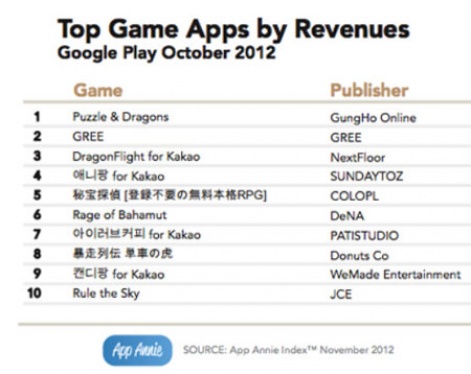The free mobile text and voice messenging service now has over 66 million users, mainly in Korea, but with expansion to Japan, the US and Spain.
More significantly, KakaoTalk's decision in mid-2012 to enable game makers to integrate its real-name social network into their content has resulted in an explosion in ultra-casual games.
Four of the top 10 grossing Android games are KakaoTalk-enabled, and both the big Korean publishers Com2uS and Gamevil are heavily supporting the platform in 2013.
We spoke to Com2uS' Don Lim to find out more about the opportunities the platform is generating.
Pocket Gamer: When did Com2uS decide to get involved with Kakao?
Don Lim: KakaoTalk (aka Ka-Talk) started its game service in the summer of 2012 and following the success of its first casual puzzle game Ani Pang [a version of Bejeweled, see below], we believed it was opening up a new market to reach non-gamers.

We released our first KakaoTalk game - Derby Days for Kakao for iOS and Android during October.
Since then, we've released three more enabled titles, including Com2uS Homerun King for Kakao, which was the #1 top grossing game in Korea during December.
What's the process of making a game KakaoTalk-ready?
There's a standard SDK to help develop games for KakaoTalk, but what's more important is that the game has to be designed with a full understanding of the social graph. This is based on real contacts and friends rather than 'in-game' friends.
There are three types of social interaction you can perform - inviting, boasting and gifting - so you have to ensure your games works with these so users can easily interact with friends. Also, game session are short, a minute or so, so gameplay needs to be quick and work within such a period.
Another important detail is that a game's user ranking is refreshed on a weekly basis, so we see that as the weekend approaches, the rate of IAPs spikes upwards as people want to achieve higher scores.
Why is Com2uS so focused on KakaoTalk considering that using it takes a slice of your net app store revenue?
What's important is KakaoTalk has introduced a new market of light or casual users to mobile gaming, which enlarges the overall market.

According to App Annie, KakaoTalk games are top grossing in Korea
Its messenger platform provides a natural gaming experience in which to compete and cooperate with your in-life friends.
It also provides new 'word of mouth' marketing opportunities to invite, recommend and gift game items to your friends.
Do you think it will be a bubble, like early Facebook, as well as being limited by Korea's population?
It's hard to predict how KakaoTalk can evolve and affect the gaming market in the longterm, but in the meantime, it is growing at a very fast speed.
In addition, we think in future, the market could move toward more mid-core and hardcore games from the current casual games.
What's your attitude to other, similar, networks like Line (Japan) and WeChat (China)?
Com2uS is open to work with any platform that helps us better reach our users.
We've already partnered with Line messenger in Japan for our Homerun Battle Burst game. We will partner with any platform that fits with our target users who would enjoy Com2uS games.
Does the rise of these new social networks mean DeNA and GREE are in trouble?
We believe they are great gaming platforms with different target users: more midcore/hardcore users than casual users. Com2uS also has our own Com2uS HUB platform.
So we are learning what features work for other platforms in order to better upgrade our own and bring a better gaming experience to our users.
Thanks to Don for his time.























